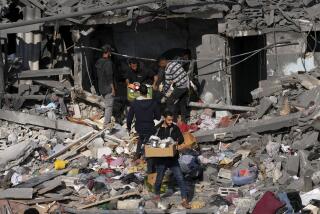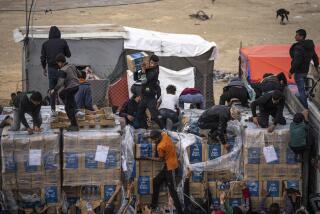Pitched Battles Erupt in Sarajevo : Bosnia: Rebel Serbs kill 3 French soldiers in deadliest clashes yet with peacekeepers. Paris threatens pullout. 220 U.N. troops now held hostage. Moscow dispatches envoys.
- Share via
BELGRADE, Yugoslavia — Bosnian Serb rebels continued to hold more than 200 U.N. soldiers hostage Saturday, and three French peacekeepers were killed after pitched battles with Serbs who captured a U.N.-held bridge near the center of the Bosnian capital, Sarajevo.
The killing of the soldiers--the deadliest direct combat between peacekeepers and Serbs in three years of war--came just hours after French President Jacques Chirac threatened to pull out his troops unless they are given better protection.
The French have the largest contingent in the U.N. peacekeeping force in Bosnia-Herzegovina, and their withdrawal could doom the entire mission and clear the way for all-out war.
The Serbs were able to seize a U.N. observation post on the bridge in Sarajevo by disguising themselves as French U.N. soldiers with equipment they have stolen in recent days, U.N. officials said.
In a flurry of diplomatic efforts, Russia dispatched senior officials to the Balkans on Saturday, and NATO ambassadors, in an emergency session, demanded the immediate release of U.N. hostages.
After cracking down on defiant Serbs by bombing their Bosnian headquarters in Pale last week, the United Nations and the North Atlantic Treaty Organization suddenly find themselves in a tense standoff with the separatists, who say their hostages will die if additional air strikes are launched.
With international resolve crumbling, the world’s diplomats were frantically seeking a way out. But the choice seemed to lie between sacrificing the lives of peacekeepers in a hardened military response or giving in to an army that has consistently flouted international conventions.
“What is being threatened here is not just the U.N. soldiers on the ground but the ability of the international community to perform . . . peacekeeping operations in the face of a hostile ground force,” U.S. Defense Secretary William J. Perry said Saturday.
Perry held two hours of talks in Naples, Italy, on Saturday with NATO Adm. Leighton Smith, who managed the air strikes that prompted the hostage-taking.
Perry had been scheduled to return to Washington on Saturday night but diverted his military aircraft to London for a hastily arranged consultation with defense ministers Malcolm Rifkind of Britain and Volker Ruehe of Germany.
U.N. officials in Sarajevo said 220 U.N. soldiers and unarmed military observers are being held by the Serbs, with 93 being used as human shields. Some have been chained to bridges and buildings around potential NATO targets.
“They are still being handcuffed and basically treated like animals,” U.N. spokesman Alexander Ivanko said Saturday night from Sarajevo.
Journalists in Pale reported seeing some hostages blindfolded and being driven around in their U.N. vehicles. Access to them was granted only to Bosnian Serb television.
*
The fighting near downtown Sarajevo began early Saturday when Serbs masqueraded as U.N. personnel--speaking French and going so far as to don blue helmets and U.N. flak jackets--and simply relieved the French of the Vrbanja Bridge observation post near Sarajevo’s Parliament building.
Realizing they had been duped, a French infantry platoon backed by light tanks and armored personnel carriers stormed back and recaptured one end of the bridge. The Serbs, firing from nearby high-rise buildings they use for sniper positions, held on to the other end.
One peacekeeper and four Serbian soldiers were killed, nine peacekeepers were wounded and four Serbs captured, Ivanko said. Another peacekeeper died of wounds later Saturday.
A second battle at Sarajevo’s front-line Jewish cemetery claimed the life of a third French soldier.
The deaths raised to 40 the number of French peacekeepers killed since the war began in April, 1992. There are 3,835 French troops in Bosnia, mainly in Sarajevo.
Milovan Milutinovic, spokesman for the Bosnian Serb army, said in Pale that Serbs attacked to prevent the French from handing the checkpoint over to Muslim-led government forces.
The Serbs in the last few days have looted U.N. posts of equipment, vehicles, uniforms and an estimated 200 heavy weapons. They have taken control of all nine U.N. arms warehouses in the Sarajevo area and have mined the single road leading out of the city.
There were calls, meanwhile, for U.N. peacekeepers to be given the right to use more force.
France’s Chirac, after paying homage to his countrymen who died Saturday, demanded that the United Nations give its peacekeeping missions “the necessary means to accomplish their task in the service of peace.” NATO allies emerged from their emergency session in Brussels to echo the call.
Chirac, who has been in office less than two weeks, worked feverishly on several diplomatic fronts Saturday to generate pressure on Bosnian Serbs. He also took one concrete military step, sending the aircraft carrier Foch and two escort ships to the Adriatic Sea to bolster the French military presence in the region.
In the most interesting diplomatic initiative, Russia dispatched its defense and foreign ministers to the former Yugoslav federation to attempt to broker a cease-fire and halt further NATO air strikes.
The move followed pleas by Chirac, President Clinton and British and German leaders for Russia, allied in the past with the Serbs, to intercede.
“Foreign Minister Andrei Kozyrev and Defense Minister Pavel Grachev have left today for the former Yugoslavia to meet the leaders of the conflicting sides in Bosnia-Herzegovina to convince them to stop military actions in order to prevent further NATO air strikes,” Russian Prime Minister Victor S. Chernomyrdin said Saturday in Moscow.
In a telephone call with Chirac on Saturday, Russian President Boris N. Yeltsin said he is “ready to use his influence” to obtain freedom for captive U.N. soldiers and “to demand the end of the bombardment of civilian populations,” according to a statement from the French president’s office.
*
The statement did not make clear whether Yeltsin was referring to NATO bombardments of Serbian targets or Serbian bombardments of Bosnia--or both.
The Russians have been critical of NATO’s use of air power, and it is far from clear whether this initiative will satisfy international calls to isolate the Bosnian Serbs or put Moscow more at odds with the West if concessions are offered to the Serbs.
From Pale, the Bosnian Serb headquarters where air strikes on Thursday and Friday destroyed half a dozen well-stocked ammunition bunkers, the rhetoric remained defiant.
“If it wishes to continue [with air strikes], the international community will have to pay a very, very high price,” said Bosnian Serb leader Radovan Karadzic’s spokesman, Jovan Zametica.
Times staff writer Scott Kraft in Paris contributed to this report.
More to Read
Sign up for Essential California
The most important California stories and recommendations in your inbox every morning.
You may occasionally receive promotional content from the Los Angeles Times.














